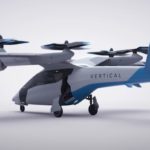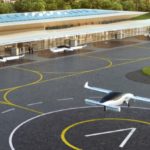This month, FINN has been focussing on the importance of training and upskilling within aviation.
Digital technologies and platforms and the emerging urban air mobility sector playing an ever-increasing role within the aviation sector.
Farnborough International’s FIA Connect held a panel discussion aimed at inspiring and advising anyone interested in following a career path within digital aviation as part of the Farnborough Friday event, aimed at informing the next generation about roles within aerospace and defence.
This year, Cranfield University will be opening its Digital Aviation Research and Technology Centre (DARTeC). Cranfield brought together industry professionals from two of its DARTeC partner companies, Boeing and Blue Bear Systems Research Ltd, to talk with the university’s Career Development Manager and the Head of Transport Systems.
The panel was made up of Gin Williams, Software Engineer. Blue Bear Systems Research Limited; Prof Graham Braithwaite, Director of Transport Systems, Cranfield University; Katrina Armstrong, Career Development Manager for Cranfield University and Carl Harris, Lead Line & Base Maintenance MRO Engineer Boeing UK.
Digital aviation: harnessing the power of data
Braithwaite said the topic ‘what was digital aviation?’ was asked around Cranfield’s campus a few years ago. He said: “Very quickly, we realized that it actually means a whole range of different things for different parts of the industry so, for some, it’s about how you take the power in a phone or in a smartphone app to to help somebody guide them way through the experience of travelling by plane somewhere.”
“For others, it’s about how do you take the power of sensors to allow us to do maintenance quite differently or how do we control our traffic differently so that we can unleash the potential of things like drones into the airspace? It means lots of things but, ultimately it’s about how you take the power of data and do something with it.”
Cranfield, together with its industry partners, won a competition run by Research England to establish DARTeC. Braithwaite added Cranfield was at an unusual advantage as it owned and operated an airport and ran the air traffic control. He said the Centre would bring together well-established players in the industry such as Boeing, together with startups including Blue Bear Systems who work with drones and unmanned traffic management.
Supporting the societal shift towards sustainability
Harris said digital aviation was providing solutions for more sustainable aviation and the activities at Cranfield could support this: “I think there’s a real societal shift at the moment to becoming sustainable in our day-to-day lives and I think Boeing as a company can really play a central role in doing that certainly accelerating new technologies, biofuels, electrical propulsion and reduce the overall footprint that not just the company but also aviation as a whole has on a more sustainable way of living.”
Williams advised those seeking careers in digital aviation not to be afraid of making leaps from other sectors into digital aviation. He explained: “I initially started at university doing an automotive engineering degree and went to work for Triumph Motorcycles and that was purely because even though I’d always wanted to be in aerospace. Due to dyslexia being found a little late, I didn’t get the grades that I’d wanted, so I didn’t think that I was smart enough to do that.”
He said it “took a leap” to apply for Cranfield but the University had provided the support which helped his career to develop.
“It’s thanks to keeping those links up making the leaps that you don’t necessarily think that you can make and it’s only through doing that and only through keeping pushing yourself do you find that actually you have skills that you never even realised were there and, I think, making sure that you find the support group around you to keep yourself growing is so important.”
Digital aviation supports a diversity of skills
He added that digital aviation required a diverse skillset, one of the factors that attracted him to the industry. He described it as “from people who are happy to be head down coding through to people who are involved in social sciences and everything in between.” He added: “That’s such a joy when you get to meet them experience those different perspectives on the world.”
Braithwaite concluded the session by flagging up the greater diversity of roles now available within aviation. He said: “I just encourage people to find out a bit more about the different roles that exist
within aviation. Classically people think, ‘well I’m going to be a pilot’ or ‘I’m going to be an engineer’ and there is so much more to the profession and yet there’s there’s something happening in aviation that’s particularly exciting at the moment and I think it’s that combination of the challenge around sustainability but also the things that we can now do thanks to the the technology and the things that we can do in drones or how we’ve taken airplanes into this amazing technologically advanced state where it can tell us what maintenance it needs or it can tell us things about the passengers or the pilots it’s such an exciting time to be in aviation and I would certainly strongly
encourage anybody to look at how they might contribute.”

